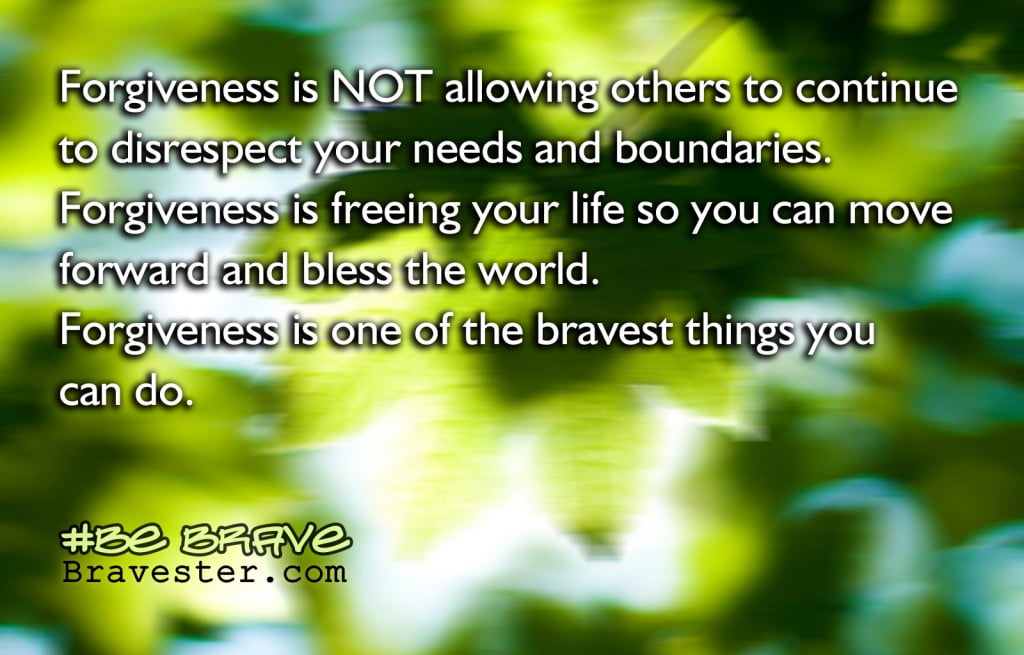Forgiveness and Correcting Wrong Are Two Different Things

Are any of these true for you:
- My life has been negatively impacted by someone who has had serious personal problems.
- I have had a willingness to work out/forgive, yet it has not done any good.
- The person who wronged me knew he/she was doing wrong, but persisted anyway.
- In spite of my attempts to be reasonable, I have been faced with stubbornness or repeated wrongs.
- I feel that my good nature was clearly taken advantage of.
- My sense of trust or loyalty ultimately worked to my disadvantage.
- My desire for a fair and pleasing relationship wasn’t matched with similar commitment or enthusiasm.
- As I look back upon the wrong behavior of another person toward me, I realize it was propelled by selfish or controlling motives.
- The misdeeds of the other person toward me could have been altered but were not.
- I have felt as if I was being treated as an inferior person.
YES! You say. Or scream. “YES, YES, YES! That is exactly what has happened to me! And let me tell you this story to let you know this is exactly what happened to me.” Then you get to tell your story (often again) and it feels good to be heard and to have someone acknowledge that hurt.
Part 1 is here.
Part 2 is here.
Part 3 is here.
It does feel good to have this wrong verified, right? To be known that you were clearly on the receiving end of some wrong behavior. You were vulnerable, you got hurt, and even though it hurts it does feel good to have this wrong verified.
But. You do not have the power to correct this wrong. Nor is it your responsibility. You are being asked to forgive. I know, you would rather have the wrong corrected. To correct the wrong keeps your vulnerability safe—especially from this person who trashed your trust. Correcting wrong is God’s job—and trust me, he does it. He will bring justice to all who have been wronged. He will not falter or lose heart until justice prevails throughout the earth. Isaiah 42:3b-4a. The Lord demands accurate scales and balances; he sets the standards for fairness. Proverbs 16:11. The Lord gives righteousness and justice to all who are treated unfairly. Psalm 103:6.
Forgiveness and correcting wrong are two different things.
Truth is…
- You cannot force another person to be aware of your feelings.
- You cannot make an individual accept responsibility for wrong-doing.
- You can share your needs with God, but then you have to recognize that you cannot dictate anything to Him. After all, He’s God and you’re not.
- You are limited in your ability to apply consequences that might cause the wrongdoer to think about his/her actions. (Yet we spend hours of thinking of just the right consequences! If only this… and If only that…)
- You are limited in your ability to sway others’ opinions so they will support your needs and views.
- Your communication capabilities are limited. They hinge on the willingness of others to hear and absorb.
Those are a lot of truths you need to read and re-read. They are all truths. We’d like them to be otherwise but truth is truth. Embrace it.
If you choose to accept your limits and release God to deliver the justice, what would be the result? How does that thought affect you right now? I hope I am creating some holy tension.
I also want to add a thought about anger and bitterness. What happened to you is the cause of anger. A wrong was done. Anger leads to pain and we all know now that pain is the beginning. Reclaiming our ability to feel is essential for learning to forgive. It hurts like crazy but it is the beginning to living a better life of freedom and hope. Romans 5:3-5 is all about this.
Bitterness is something completely different. And bitterness is an option for you. Bitterness numbs that pain. It is a coping behavior that poisons you and your other relationships. Bitterness also implies that you wish you could possess God-like powers that you will never have.
If you choose bitterness or have bitterness, then ask yourself these questions:
- Does choosing bitterness make you feel powerful?
- Does choosing bitterness keep you from ever seeing yourself as happy again?
- Does choosing bitterness give you the excuse to withdraw?
- What would be the likely consequences of you choosing bitterness?
- How would you benefit by choosing to set aside bitterness?
- Why might forgiveness be a better option than bitterness?
- What consequences might you expect by choosing forgiveness?
These are some tough questions that I ask you to answer honestly.
This is why forgiveness is more for you than it is for the other person. The other person is left to the justice of God. What is in your control is your choice to choose love, choose freedom, and choose bravery.
Have we entered into the realm of possibility? Are you ready to begin this journey to forgiveness which begins in pain and ends in hope?
Next up is steps to do that. These are brave steps.
Source recommendation: The Choosing to Forgive Workbook by Les Carter & Frank Minerth
(Photo credit: Luke Porter, Unsplash.com)






Comments
Trackbacks & Pingbacks
[…] and correcting wrong are two different things. You are not being asked to correct the wrong. Or to make the unfair fair. […]
[…] Forgiveness and correcting wrong are two different things. You are not being asked to correct the wrong. Or to make the unfair fair. This is God’s responsibility. And trust me, God is all about justice. Especially justice for you whom he loves so much. […]